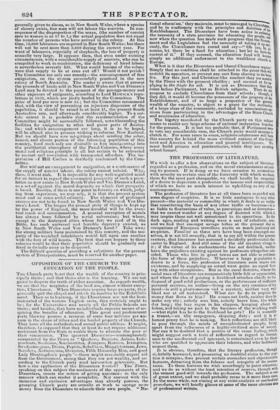OPPOSITION OF THE CHURCH TO THE EDUCATION OF THE PEOPLE.
Tits; Church party boast that the wealth of the country is prin- cipally theirs ; and that theirs also is the learning. We are not going to dispute the truth of either assertion. As regards wealth, we see that the magnates of the land are, almost without excep- tion, Churchmen. When Dissenters acquire large property, they geneially quit the chasel and attach themselves to the Establish. ment. Then as to learning, if the Churchmen are not the best- instructed of the various English sects, they certainly ought to be ; for the Universities and nearly all the Public Schools are theirs; and besides, they have as individuals superior means of ac- quiring the benefits of education. This great and predominant patty likewise possess a revenue of some four millions per an- num in the shape of tithes and the landed property of the Church. They have all the cathedrals and sacred public edifices. It might, therefore, Le supposed that they at least do not require additional assistance from the State to enable them to educate the poor or their communion. The ignorant Dissenters—contemptuously enumerated by the Times as " Quakers, Baptists, Arians, Inde- pendents, Socinians, Southcottites, Jumpers, Ranters, lrvingites, Sweden borgians, Deists, Papists, Sabellians, Muggletonians, Jews, Seceders, Antinomians, Owenites, Fifth Monarchy Men, and good Lady Huntiugdon's people "—these might reasonably expect aid from the Government, seeing that they are not wealthy, and ac- cording to the Church party need instruction grievously. But how is the application of the Dissenters treated ? The Times, speaking on this subject the sentiments of the opponents of the Dissenters, scouts the notion of giving assistancs in the only manner which can render it acceptable. Not content with the immense and exclusive advantages they already possess, the grasping Church party are actually at work to sponge more money from the Dissenters to educate their own people.. " Na- tional education," they maintain, must be managed by Church* and be in conformity with the principles and doctrines ef Establishment. The Dissenters have been active in enforein; the necessity of a state provision for educating the people; ati now when the question has made such progress that the Corers ment and the Legislature feel the necessity of taking it up ors ously, the Churchmen turn round and say—" Oh yes, by 41 means, let there be a fund for education; but let us havens control of it." It' they succeed, the education fund will hewnj. simply an additional endowment to the wealthiest church s Europe.
What is it that the Dissenters and liberal Churchmen require Simply that no condition shall be attached to the grant that will restrict its operation, or prevent any sect from sharing in its bene- fits. For this just and Christian-like conduct they are assailed by the Times with the grossest ribaldry ; and sneered at feral,. plying to the State for aid. It is not as Dissenters that they come before Parliament, but as British subjects. They do se propose to exclude Churchmen from their schools ; though, s they did, it would ill become the possessors of the property of the Establishment, and of so large a proportion of the genets wealth of the country, to object to a grant for the instruction of a large class of the community, excluded by conscientious opi. nions from participating in the advantages of the State Church and seminaries of education.
The bigotry manifested by the Church party on this subject seems to render any large scheme of national instruction hopeless for the present. It is but too probable that, if Parliament were to vote any considerable sum, the Church party would manage to clutch it. For some years to come, religious intolerance will keep this country far behind the more civilized nations of the Conti- nent and America in education and general intelligence. 1Ve must build prisons and penitentiaries, while they are erecting school-houses.


























 Previous page
Previous page